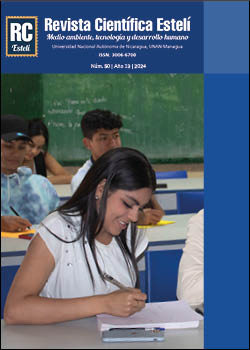Strategies of the competency-based model and its implementation in the practice of teachers of UNAN-Managua
DOI:
https://doi.org/10.5377/esteli.v13i50.18476Keywords:
Competency, didactic strategies, evaluation strategies, competency-based model, teaching practiceAbstract
The main purpose of this research was to identify in the teachers of the doctorate in Management and Quality of Education (III- Cohort), taught by the Faculty of Education and Languages of the UNAN-Managua, the methodology implemented for the integration of the teaching groups and the didactic strategies used in their pedagogical practice to manage the competency-based model. It was a field study, where according to the philosophical approach it is a qualitative research, because the lived experiences are studied from the perspective of the informants. For the collection of information, an online questionnaire was applied to them, this does not invalidate the qualitative nature, since according to Rodrigues (2023) the instruments of quantitative and qualitative methods are not mutually exclusive. The selected sample consisted of 13 participants. The selection criteria were: to be teachers at UNAN-Managua and to be teaching in the competency-based model in the different careers. For the analysis of the information, bar graphs were used. The results showed that the methodology implemented allowed the integration of the group of teachers, of contents, as well as the contribution of the components to the integrating strategy, and highlighted as an area to be reinforced the teachers’ mastery of the competency-based model. In relation to the didactic and evaluation strategies used by teachers, these are linked to an eclectic model, given the convergence of strategies that favor the competency-based model: case study, cooperative work and problem-based learning (PBL), peer evaluation and portfolios; as well as traditional strategies such as summaries, lectures, exams and written tests. It can be concluded that the teaching practice evidences a transition process from a content-centered model to a competency-based model.
Downloads
References
Universidad Nacional Autónoma de Nicaragua, Managua (UNAN-Managua). (2020). Diseño Curricular para desarrollar competencias en la UNAN-Managua. Managua:Autor.
Arguedas-Ramírez, A., y Camacho-Oviedo, M. (2021). La integración curricular como experiencia de aprendizaje: Hoja de ruta para su aplicación en dos cursos de formación docente en el área de educación primaria. Revista Electrónica Educare , 25(3), 339-356. https://www.redalyc.org/journal/1941/194169815019/html/
Calvo, A. (2015). Viaje a la Escuela del Siglo XXI. Madrid: Fundaciín Telefónica. https://www.fundaciontelefónica.com/cultura-digital/publicaciones/476/
Escobar Soriano, Á., Videa, X. L., y de Armas, R. (2021). Armonización de las Carreras de Educación en Nicaragua: experiencia y proyecciones. Revista Torreón Universitario, 10(27), 8-18. https://repositorio.unan.edu.ni/18297/2/40233.pdf
García, M., y Morillas, L. (2011). La planificación de evaluación de competencias en Educación Superior . Revista Electrónica Interuniversitaria de Formación del Profesorado, 14(1), 113-124. https://www.redalyc.org/pdf/2170/217017192009.pdf
Gómez López, L. (2008). Los determinantes de la práctica educativa. Universidades(38), 29-39. https://www.redalyc.org/articulo.oa?id=37303804
Hernández Sampieri, R., Fernández Collado, C., y Batista Lucio, M. (2014). Metodología de la Investigación (6 ed.). México: McGRAW-HILL. https://apiperiodico.jalisco.gob.mx/api/sites/periodicooficial.jalisco.gob.mx/files/metodologia_de_la_investigacion_-_roberto_hernandez_sampieri.pdf
Hernández, I., Lay, N., Herrera, H., y Rodríguez, M. (2021). Estrategias pedagógicas para el aprendizaje y desarrollo de competencias investigativas en estudiantes universitarios. Revista de Ciencias Sociales (Ve), 27(2). https://www.redalyc.org/journal/280/28066593015/28066593015.pdf
Mantilla-Falcón, L., Miranda Ramos, D., Ortega Zurita, G., y Meléndez-Tamayo, C. (2020). Hibridación de modelos pedagogicos en la práctica docente en la educación superior en Ecuador. Caso Universidad Técnica de Ambato. Cuadernos de Investigación Educativa , 11(1), 85-101. https://www.researchgate.net/publication/340653272_Hibridacion_de_modelos_pedagogicos_en_la_práctica_docente_en_la_educación_superior_en_Ecuador_Caso_Universidad_Tecnica_de_Ambato
Martínez, L. (2016). Mas allá de la calificación. Instrumento para evaluar el aprendizaje. Concepción: Universidad de Concepción. Trama Impresores S.A. http://docencia.udec.cl/unidd/images/stories/contenido/material_apoyo/libro%20mas%20alla%20baja.pdf
Ortis, L. (2016). Estrategias metodológicas utilizadas en el desarrollo de la asignatura “laboratorio didáctico de la física” y su incidencia en el aprendizaje de los estudiantes de cuarto año de la carrera de física de la facultad de educación e idiomas de la universidad nacional autónoma de nicaragua, managua, en el i semestre del año académico 2015 [Tesis de Maestría, Maestria en pedagogía Con mención en docencia universitaria].https://repositorio.unan.edu.ni/2735/1/2523.pdf
Palma, O., y Linares, M. (2019). Competencias investigativas y su pertinencia en el desarrollo de una tesis doctoral. REDINE, 12(1), 44-52. https://revistas.uclave.org/index.php/redine/article/download/2410/1410/2418
Rodrigues, F. (2023). El cuestionario en una investigación cualitativa: reflexiones teórico-metodológicas. Revista Pesquisa Qualitativa, 11(26), 28-49. https://www.researchgate.net/publication/368919618_EL_CUESTIONARIO_EN_UNA_INVESTIGACION_CUALITATIVA_REFLEXIONES_TEORICO-METODOLOGICAS
Torres, J., y González, E. (2018). Modelo de la educación por competencia. https://repository.usta.edu.co/bitstream/handle/11634/28987/capitulo2modelodelaeducacion2018edithgonzalez.pdf;jsessionid=99F288F3104AE9E6C9E1432B3E8706FF?sequence=1
Useche, M., Artigas, W., Queipo, B., y Perozo, É. (2019). Técnicas e instrumentos de recolección de datos cuali-cuantitativos (1 ed.). Colombia: Editorial Gente Nueva. https://www.researchgate.net/publication/344256464_Tecnicas_e_instrumentos_de_recoleccion_de_datos_Cuali-Cuantitativos
Vallejos, M., Salinas, L., y Leonor, C. (2019). Desarrollo de estrategias educativas en un modelo curricular por competencias. Cuadernos de Educación y Desarrollo, 20-23. https://www.eumed.net/rev/atlante/2019/04/estrategias-educativas.html
Downloads
Published
Issue
Section
License
Copyright (c) 2024 Revista Científica Estelí

This work is licensed under a Creative Commons Attribution-NonCommercial-ShareAlike 4.0 International License.

